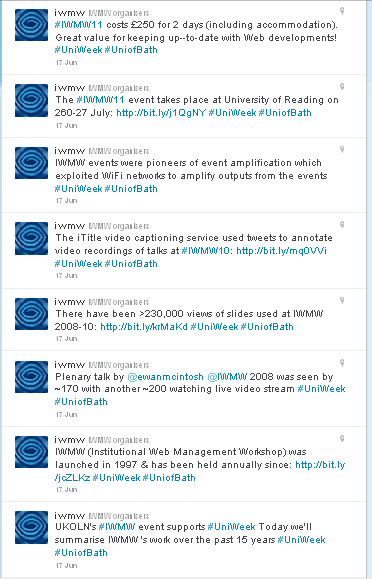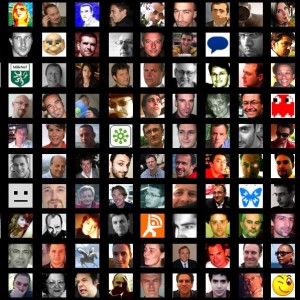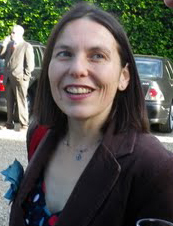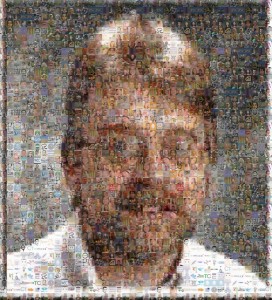It’s been an interesting year for Higher Education. Last year we were very much in the dark regarding where we stood financially. This year things are a lot clearer. The comprehensive spending review outlined cuts of 40% in teaching budgets and the Browne report announced that there should be no limit on fees charged by universities. The end result is that two-thirds of Universities want to charge the £9,000 maximum fees for some or all their courses.
So what does this mean to Web departments?
Well, it means that numbers matter. Higher Education Institutions have become even more competitive than they were previously: numbers of people through the doors, the percentage of people passing courses and similar statistics have always been important but at a time of cuts there is a even greater need to gather and use evidence of the value of the services we provide.
Plenary Talks
This year’s opening plenary on Tuesday 26th July entitled OK, we know what you do, so how much is it worth? will be given by Ranjit Sidhu from Software into Decisions.
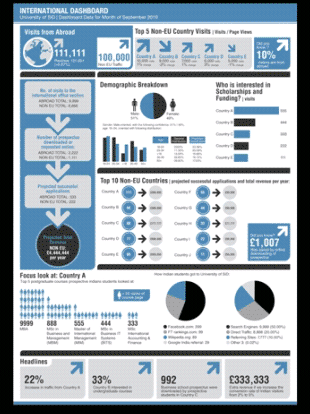
A University dashboard
Last year Ranjit’s plenary on ‘So what do you do exactly?’ In challenging times justifying the roles of the web teams struck a chord with many delegates. Ranjit applied business models to University Web sites to demonstrate the true value of the Web.
This year he will look at combined data and analysis work that he is carrying out with universities which will present monetary values for the delivery information, recruiting students online etc. Ranjit will also be demonstrating the dashboards he helps institutions create, through combining online and offline data.
Following on from Ranjit is a talk by Amber Thomas on Marketing and Other Dirty Words. Amber is a Programme Manager in the JISC Digital Infrastructure Team. She will look at how the resources your institution releases can have maximum impact. How can they be effectively presented to aid in marketing and recruitment, and to increase engagement with the world outside the university. The talk will also consider usage tracking and strategy, with ideas for how we can present our intellectual assets online to get maximum effect.
There are further important metrics which will be described in Tom Franklin’s session on Using activity data to support your users. Tom will consider how usage data (accesses a web page, navigation and form details, searches) can be used to provide better to support your users in a variety of ways. The talk, based on work currently being undertaken in the JISC Activity Data programme, will discuss some of the issues that need to be addressed if you want to undertake this type of work, including intellectual property rights (IPR) and privacy, and it will outline some approaches that are currently being undertaken and the perceived benefits.
Parallel Workshops
In his session Maximising Institutional Webmaster Impact George Munroe, who has recently worked with Netskills, will explore how institutional web managers can be most effective at their work by considering a number of areas that influence a webmaster’s effectiveness, including users, process, technology, skills and metrics.
In their efforts to save money many institutions will want to outsource more. In the session Developing Using Third Parties – is the tail wagging the dog? Keith Doyle from Navopia User Experience will look at what it’s like to work with third parties and the issues we need to be clear about. He will also share his valuable experiences of dealing with third parties.
Another way to save money can be by looking at free tools that can carry out tasks. In The Economical way to Amplify Your Event Marieke Guy and Brian Kelly will consider what you need to do to successfully amplify an event (ideas include effective use of slides, images, twitter, blogs etc. videoing and streaming content etc.); the free and not-so-free tools that are out there for you to use (e.g. Ustream, Bambuser, Lanyrd, Elluminate, Panopto, Big Blue Button etc.) and the equipment it would be useful to have (e.g. camera, phone etc.). They will also look at what issues you will need to bear in mind (e.g. copyright, quality etc.) by offering tips and inviting delegates to share experiences.

